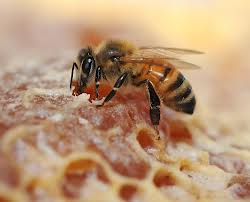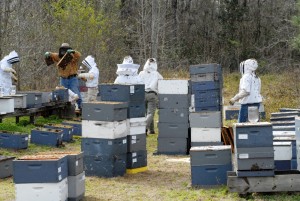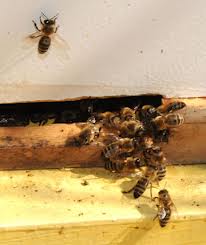
During periods of scarce food resources, foraging bees, like the one shown here, invade weaker hives and rob them of their honey. Photo by Kathy Keatly Garvey, UC Davis
Honey bees laboriously gather their food (nectar and pollen) from flowers in bloom and store it in the hive for use when needed. When nectar sources are scarce or unavailable locally, bees are attracted by the honey stored in neighboring hives. Bees from strong colonies raid hives that are unable to defend themselves and steal the weak colonies’ honey or sugar syrup. This behavior of thievery as opposed to the customary colony collections of nectar from flowers is termed “robbing.” (From Robber Bees by Khalil Hamdan)
Generally, robbing occurs especially during a dearth, or scarcity, of nectar. Bees will never rob during a nectar flow or as long as abundant nectar is available in the field. As nectar becomes more scare, the intensity of robbing increases. Strong colonies rob the weaker ones or those that are poorly guarded. The robber bees are the forager, or scout, bees. They are after honey, and do not steal pollen or damage brood. (From Robber Bees by Khalil Hamdan)
From a bee’s point of view, robbing is just a type of foraging behavior. A potential robber is a scout bee seeking resources for her colony. She lands at the entrance of a weak hive and fights with a guard bee; these battles are fierce and one of the bees may die. If the robber wins entry, she seeks out cells of honey or syrup, fills her crop with it, and returns to her colony to deposit her spoils and recruit more robbers. A robber bee will try to enter the colony any way possible, including under the lid, around the area where supers join, at other joints in the colony, or any cracks and holes in old wooden-ware.
A weak colony does not have enough bees to defend against large numbers of robbers from a more populous colony. Robbing bees become accustomed to a source of syrup/nectar/honey and may rob a weak colony for several days in a row. This relentless attack dooms the colony unless the beekeeper intervenes.
As with many other problems in beekeeping, robbing can be reduced by maintaining queen-right colonies of uniform strength. Weak colonies set among stronger neighbors are at great risk. Once stronger hives begin robbing weaker ones, an escalating feeding frenzy can engulf the whole apiary, with bees from many hives robbing each other.
If robbing begins in an apiary, it is nearly impossible to stop the first day. However, the following management practices should help:
- Eliminate the stimulus. Clean up or cover exposed honey or syrup and tape shut cracks between supers.
- Reduce entrances of vulnerable colonies with entrance reducers or grass.
Note: If you take these steps, robbing usually will not resume the next morning.
If robbing is a chronic problem in your apiary:
- move weaker colonies to another location.
- Fix the problem that made the hives weak in the first place; requeen, feed, or equalize as needed.

Sometimes an escalating feeding frenzy can engulf the whole apiary, with bees from many hives robbing each other. Photo by: University of Florida Honey Bee research and Extension Lab
If you must work hives during robbing conditions, take precautions to protect colonies.
- Work hives carefully but quickly.
- As you remove supers and set them aside, cover them with lids to contain the honey odor.
- If you spill honey or syrup on the ground, cover it up with earth or leaves.
- Avoid dripping syrup on the outside hives.
- Work bees later in the day. This gives robbing bees less time to work into a frenzy.
As a final note, you should not use chemical repellents, such as carbolic acid or phenol, at the entrance of a hive to keep robbing bees away. Though the robbing bees may be repelled by the odor, bees living in the hive may also be repelled as well.
Sources of Further information:
How to handle robbing in your beehive
Honey Bees and Beekeeping – A Year in the life of an Apiary – By Keith S. Delaplane. 138 pages Published January 28th 1996 by University of Georgia, Georgia Center for Continuing Education, Cooperative Extension Service
- Things to Consider When Moving Honey Bee Hives - May 29, 2015
- Honeybees are Valuable Pollinators - December 19, 2014
- Manage Honey Bees Now to Prepare for Next Year’s Nectar Flow - August 1, 2014

